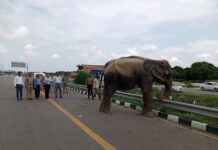(Deepshikha Gautam, Intern Journalist) New Delhi: National Water Life Mission in partnership with the Ministry of Electronics and Information Technology (MEITY) to develop ‘Smart Water Supply Measurement and Monitoring System’ at the village level to develop an ICT Grand for innovation, streamlined and low-cost solutions Started the challenge.
Its deadline was 12 October 2020. A total of 213 proposals have been received from various Indian technical start-ups, MSMEs, Indian companies, and Indian LLPs, which will now be examined by the Jury Committee constituted by MEITY and will select the correct proposals. This ambitious mission is not just about building infrastructure, but also about the delivery of services.
Such technical challenges provide great opportunities to ensure the long-term sustainability of water supply systems in rural areas. This Grand Challenge will use India’s vibrant Information and Technology (IoT) eco-system to create smart rural water supply eco-systems to measure and monitor water supply services in rural areas. This challenge will provide an opportunity to work for the Water Life Mission and ensure potable water supply to all rural households in the country through functional household tap connections.
The Grand Challenge will provide support on the Ideation Stage, the Experimental Development Phase (Prototype Development Stage), and the Deployment Stage. This pilot project will be implemented in 100 villages. The best solution partner will be given Rs 50 lakh and each runner up will get a cash prize of Rs 20 lakh. Successful developers will also be given the opportunity to join a MEITY supported incubator to mature their solutions. This will promote ideas and efforts like Self-reliant India, Digital India, and Make in India.
The Central Government’s ambitious program- Jal Jeevan Mission (JJM) is being implemented with the partnership of states to provide functional domestic tap water connections (FHTC) to every rural household by 2024. The major focus of this program is on long-term bases domestic services such as regular adequate quantity and fixed quality water supply. It has mandated the systematic monitoring of the program and the use of modern technology to collect data on an automated basis to ensure the quality of services. The digitization of the water supply structure has the potential to solve some of the country’s major social problems. Most importantly, it will help predict and solve future challenges.






